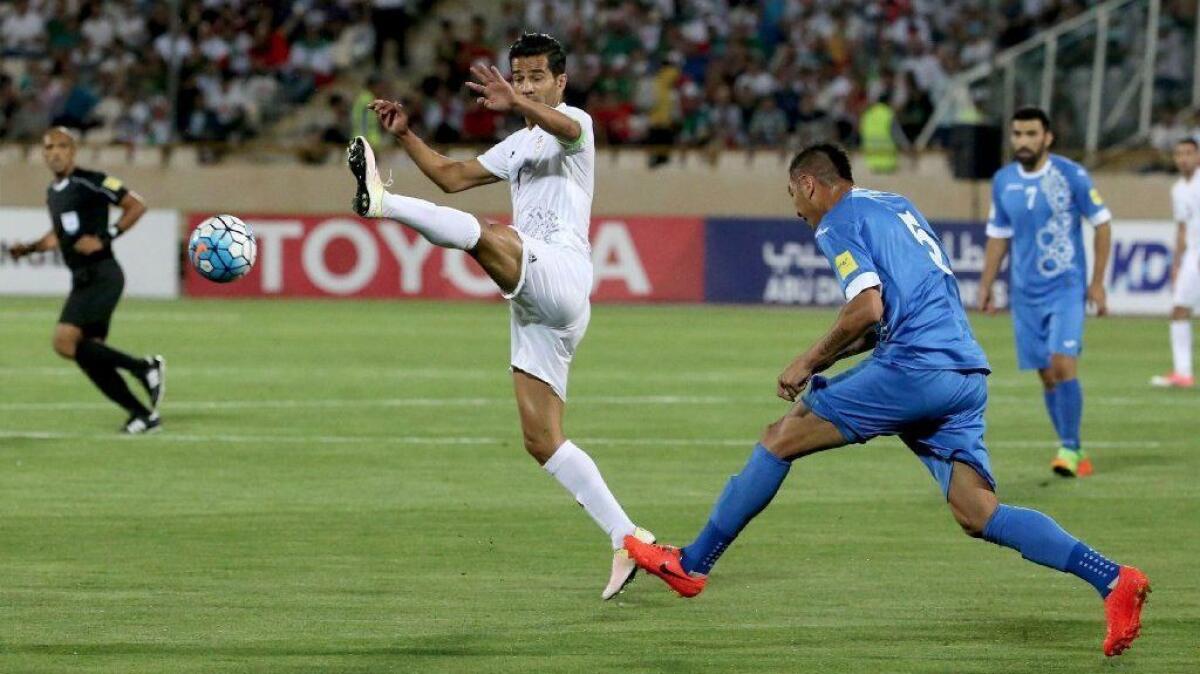After Iran bans two soccer players for playing against Israelis, fans rush to their defense

- Share via
Reporting from Tehran — Two soccer players have been barred for life from Iran’s national team after they appeared in a match against players from Israel, prompting anger among the sport’s many fans in the Islamic Republic.
Masoud Shojaei and Ehsan Haji Safi played last week in a European league match for the Greek team Panionios against Maccabi Tel Aviv, an Israeli club. That appeared to violate a longstanding rule prohibiting Iranian athletes from competing against opponents from Israel, a nation that the Iranian government doesn’t recognize.
After the match, a Farsi-language Twitter account maintained by the Israeli foreign ministry posted a message: “Well done to Masoud Shojaei and Ehsan Haji Safi who broke the taboo of not playing in matches against Israeli athletes.”
On Wednesday, Iran’s deputy sports minister, Mohammad Reza Davarzani, said in an interview with Mizan news agency, the mouthpiece of Iran’s judiciary, that the players would no longer be allowed on the national soccer team.
“It is certain that Masoud Shojaei and Ehsan Haji Safi will never be invited to join the national football team because they violated the red line,” state television quoted Davarzani as saying.
The comments set off vigorous discussion on social media in Iran, where soccer is the most popular sport. Iran’s soccer federation, the sport’s governing body, did not immediately confirm the players’ suspensions, but Davarzani said his ministry had the authority to make the decision.
For many years, Iranian athletes on the international stage have hewed to an unwritten rule that they not play against Israelis, with many feigning illness or using other ruses to avoid head-to-head competitions.
Shojaei and Safi, both of whom are under contract to play for the Greek club, appeared to observe part of the custom when they sat out a match last month against Maccabi, played in Israel.
But both played the full 90 minutes in the Aug. 4 match in Greece, which their team lost, 1-0.
Many soccer fans defended the players for honoring their contract and accused Davarzani of politicizing a sport in which Iran, which has qualified for the 2018 World Cup, struggles to compete on an international level. Its soccer ambitions have been hampered by official mismanagement and international economic sanctions.
“Iranian footballers need to be internationalized and play in [Europe] to bring hard currency and new techniques and experience to help domestic football,” said Ali Samienia, a 64-year-old coach in a youth soccer league in Tehran.
“What is the fuss? It’s not a big deal. Iranian politicians are pushing politics into sport, especially football.”
Iranian hard-liners have been asserting themselves in recent months following the re-election victory of President Hassan Rouhani, a relative moderate.
Rouhani, who campaigned on expanding personal freedoms and improving relations with the West, has frustrated supporters by failing to appoint any women to his Cabinet — an apparent show of deference to the conservative clerics who are the custodians of the country’s theocracy.
Soccer fans said the players’ suspensions could affect Iran’s World Cup hopes – especially the loss of Shojaei, the captain of the national team who played 70 minutes in a victory over Uzbekistan in June that clinched Iran’s spot in the quadrennial tournament. Safi did not play in the match.
“Shojaei’s absence will have a negative impact on Iran’s matches in the World Cup,” said Reza Agharahimi, a 30-year-old soccer fan in Tehran. “It would be better to think of the infrastructure of Iranian football rather than pay attention to minor, unimportant issues which are politics and have nothing to do with sport.”
Special correspondent Mostaghim reported from Tehran and Times staff writer Bengali from Mumbai, India.
Follow @SBengali on Twitter
More to Read
Sign up for Essential California
The most important California stories and recommendations in your inbox every morning.
You may occasionally receive promotional content from the Los Angeles Times.














